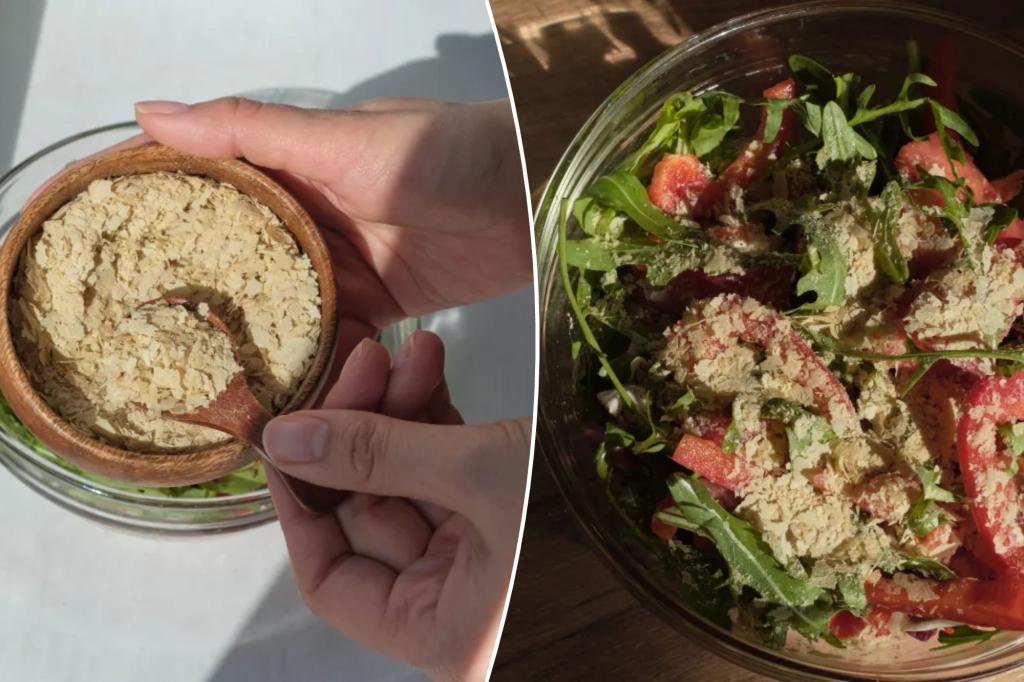Hold the parm, pass the nooch.
The plant-based seasoning, officially called nutritional yeast, has long been a go-to for vegans looking to give their food a savory, umami boost.
But it’s not just about flavor. Nooch is packed with vitamins, minerals and other nutrients that can do wonders for your health. Here’s how to use it — and why newbies should proceed with caution.
What is nutritional yeast?
It’s made from Saccharomyces cerevisiae, an ancient species of living yeast, according to Food Network.
The single-celled fungus is also used to bake bread, but nutritional yeast goes through a heating and drying process that deactivates it, stripping it of its leavening properties.
That same process unlocks its amino acids and gives nooch its signature nutty, savory flavor. Afterward, it’s crushed into flakes or ground into powder and packaged.
People commonly sprinkle nutritional yeast on popcorn, pasta, salads, and roasted veggies to amp up the flavor. It’s also stirred into soups, stews, and sauces as a thickening agent.
What are the health benefits of nooch?
Natural nutritional yeast contains a few nutrients on its own, but most of the products on store shelves are fortified — meaning they’ve been enriched with added vitamins and minerals.
“Nutritional yeast is a beneficial food for anyone, but particularly so for those following a plant-based diet,” Christina Manian, a registered dietitian nutritionist, told Real Simple.
“This is primarily due to the B vitamins it contains, including thiamin, riboflavin, niacin, B6, folate, and B12. These will all aid in optimal energy metabolism in the body,” she noted.
B12 is especially important, since it’s hard to get on a vegan diet. The vitamin supports healthy blood and nerve cells, helps your body make DNA and can give you an energy boost.
Folic acid, another B vitamin, is essential for women who may become pregnant, helping protect developing fetuses from certain birth defects. The CDC recommends 400 micrograms per day — and most nooch products provide more than that in a single serving.
Nutritional yeast also delivers antioxidants like glutathione and selenomethionine, which help break down free radicals, fight inflammation, and may lower the risk of chronic disease.
It’s also one of the few plant-based foods that contains all nine essential amino acids that the body can’t produce on its own, making it a complete protein like those found in animal products, according to WebMD.
These amino acids are necessary for building and repairing tissues, producing enzymes and hormones and supporting overall health.
“Nutritional yeast contains heart-healthy protein that doesn’t contain artery-clogging saturated fat and cholesterol, and is low in sodium,” Maxine Smith, a registered dietician, told Parade.
It’s also rich in beta-glucan, a type of fiber that can lower cholesterol and strengthen the immune system. One study found people who ate nutritional yeast were 25% less likely to catch a cold, and those who did had milder symptoms compared to a placebo group.
That same fiber supports digestive health, acting as a prebiotic that feeds good bacteria in your gut and promotes regular bowel movements.
Some studies also suggest it may help people with IBS, with researchers finding that patients who took 500 mg daily for eight weeks had fewer issues with bloating, pain, and discomfort.
Nutritional yeast also contains chromium, a mineral that plays a role in regulating blood sugar. Combined with its fiber content, nooch may help curb cravings and keep you fuller longer — which could support a healthy weight and reduce the risk of diabetes and heart disease.
What are the potential downsides of nooch?
Before you start dumping nutritional yeast onto everything, take a beat. Too much of a good thing can backfire.
Some brands pack more than the recommended daily amount of niacin (vitamin B3) into just two tablespoons, according to Harvard Health.
High doses of niacin can cause flushing, where your arms, face, and chest turn red and start to burn, itch, or tingle. It may also bring on headaches, rashes and dizziness.
Nooch is also loaded with fiber, packing about 20% of your daily needs in a two-tablespoon serving. While most Americans could use more in their diet, increasing your intake too quickly can lead to bloating, cramping and other uncomfortable gastrointestinal symptoms.
If you have a yeast allergy or bowel diseases like Crohn’s or ulcerative colitis, nutritional yeast could make symptoms worse.
It also contains tyramine, a compound that can interact dangerously with a class of antidepressants known as MAOIs. For people on these medications, even small amounts can trigger a sudden spike in blood pressure and painful headaches.
How to use it without losing it
If you have any dietary sensitivities or preexisting conditions, check with your doctor before adding nutritional yeast to your diet.
There’s no official recommendation for how much to eat per day, but starting with one tablespoon and gradually increasing from there is a safe bet, according to Verywell Health.
Nutritional yeast can be an easy and tasty way to add extra vitamins, minerals and protein to your meals — but experts say you shouldn’t treat it like a multivitamin.
“It is meant to be a condiment, not taken as a supplement or eaten in excess,” Nancy Oliveira, a registered dietitian, told Harvard Health.
Read the full article here

